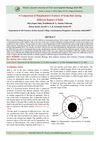 5 citations,
November 2011 in “Expert Review of Dermatology”
5 citations,
November 2011 in “Expert Review of Dermatology” The document concludes that early diagnosis and a comprehensive treatment plan are crucial for managing hair loss in children, with a focus on both medical and psychological support.
 30 citations,
May 1991 in “Psychosomatics”
30 citations,
May 1991 in “Psychosomatics” Some psychiatric medications can cause reversible hair loss.
 10 citations,
August 2018 in “Dermatologic Surgery”
10 citations,
August 2018 in “Dermatologic Surgery” Laser treatment improves hair density and increases growth factors in androgenetic alopecia.

Topical minoxidil helps treat hair loss in teens, but more research needed for safe options.
 127 citations,
December 2007 in “Journal of Investigative Dermatology”
127 citations,
December 2007 in “Journal of Investigative Dermatology” Mice hair growth patterns get more complex with age and can change with events like pregnancy or injury.
 3 citations,
July 2018 in “JAAPA”
3 citations,
July 2018 in “JAAPA” Some birth control pills can cause hair loss, and switching to ones with less androgen should help.
 February 2010 in “Journal of The American Academy of Dermatology”
February 2010 in “Journal of The American Academy of Dermatology” Mimicking growth factors in a topical solution can prolong hair growth phase and reduce hair loss without side effects.
 May 2021 in “British Small Animal Veterinary Association eBooks”
May 2021 in “British Small Animal Veterinary Association eBooks” If a dog's skin tests are normal but it has hair loss, consider other non-endocrine causes and choose tests based on the hair loss pattern.
 March 2003 in “CRC Press eBooks”
March 2003 in “CRC Press eBooks” Telogen effluvium is hair loss caused by many hairs stopping growth suddenly, often due to stress or illness, but sometimes it's normal and not due to disease.
 34 citations,
March 2001 in “Cleveland Clinic Journal of Medicine”
34 citations,
March 2001 in “Cleveland Clinic Journal of Medicine” Manage hair shedding by identifying triggers, possibly using supplements or medications, and tracking with a health calendar.
 2 citations,
January 2022 in “Clinical, Cosmetic and Investigational Dermatology”
2 citations,
January 2022 in “Clinical, Cosmetic and Investigational Dermatology” The refined wash test is a reliable way to measure daily hair loss and can tell the difference between different types of hair loss.
 28 citations,
May 2012 in “Veterinary Dermatology”
28 citations,
May 2012 in “Veterinary Dermatology” Different types of dog hair loss are linked to problems starting the hair growth phase and early hair cycle ending.
 1 citations,
January 2021 in “Skin appendage disorders”
1 citations,
January 2021 in “Skin appendage disorders” Chemotherapy patients don't all lose their hair due to factors like hair growth rates, age, genetics, and the type of drugs used.
 30 citations,
September 2017 in “Clinics in Dermatology”
30 citations,
September 2017 in “Clinics in Dermatology” Men with common hair loss may have a higher risk of heart disease and diabetes, and should be checked for these conditions.
 December 2022 in “Kristu Jayanti Journal of Core and Applied Biology (KJCAB)”
December 2022 in “Kristu Jayanti Journal of Core and Applied Biology (KJCAB)” Scalp hair characteristics vary across different regions of India and can help identify a person's origin.
 60 citations,
April 2012 in “Physiology”
60 citations,
April 2012 in “Physiology” The document concludes that understanding hair and feather regeneration can help develop new regenerative medicine strategies.

Stress significantly contributes to hair loss, especially in women and those aged 31-40.
 15 citations,
January 2015 in “Skin Pharmacology and Physiology”
15 citations,
January 2015 in “Skin Pharmacology and Physiology” Parathyroid hormones are important for hair growth, but their use in treating hair loss from chemotherapy is still uncertain.
 5 citations,
November 2021 in “Skin appendage disorders”
5 citations,
November 2021 in “Skin appendage disorders” Hair loss can cause stress and mental health issues, so treatments should address both the physical and psychological aspects, involving a team of dermatologists, psychologists, and hair specialists.
 January 2019 in “Springer eBooks”
January 2019 in “Springer eBooks” Some chemicals and drugs can cause hair loss, which usually grows back after stopping the treatment.
 26 citations,
January 2007 in “Organogenesis”
26 citations,
January 2007 in “Organogenesis” Bioengineering can potentially treat hair loss by regenerating hair follicles and cloning hair, but the process is complex and needs more research.

Nanocarriers with plant extracts show promise for safe and effective hair growth treatment.
 August 2023 in “Journal of Cosmetic Dermatology”
August 2023 in “Journal of Cosmetic Dermatology” QR678 Neo® improved seborrheic dermatitis symptoms in a small group of patients.
 January 2024 in “Medicine”
January 2024 in “Medicine” Hypothyroidism is often linked to the hair loss condition telogen effluvium.
 June 2024 in “Skin Research and Technology”
June 2024 in “Skin Research and Technology” Botulinum toxin treatment improves hair follicle width and length in androgenetic alopecia.

Topical treatments like minoxidil and corticosteroids are effective for hair loss, with JAK inhibitors promising for alopecia areata.
 8 citations,
March 2020 in “Frontiers in Cell and Developmental Biology”
8 citations,
March 2020 in “Frontiers in Cell and Developmental Biology” Researchers created immortal human skin cells with constant testosterone receptor activity to study hair loss and test treatments.
 December 2024 in “Asian Journal of Pharmaceutical and Clinical Research”
December 2024 in “Asian Journal of Pharmaceutical and Clinical Research” Combining synthetic and herbal treatments may help with hair loss, but more research is needed.
 25 citations,
January 2021 in “Journal of drugs in dermatology”
25 citations,
January 2021 in “Journal of drugs in dermatology” Sonidegib and vismodegib are similarly effective for advanced basal cell carcinoma, but sonidegib might have a slightly better safety profile.
 18 citations,
March 2016 in “Cosmetics”
18 citations,
March 2016 in “Cosmetics” Telogen Effluvium is a condition causing excessive hair loss due to stress, illness, drugs, or hormonal changes, and can be treated with specific products or naturally resolves after 3-4 years.






























